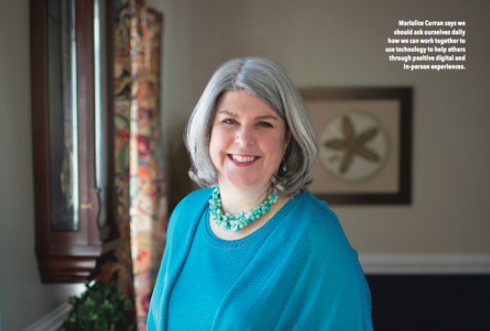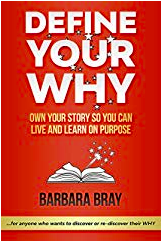Dr. Marialice B.F.X. Curran has served as an associate professor, middle school teacher, principal and library media specialist. She is a researcher, keynote, international speaker and TEDxYouth speaker. Marialice is a pioneer in digital citizenship and is Founder and Executive Director of the Digital Citizenship Institute.
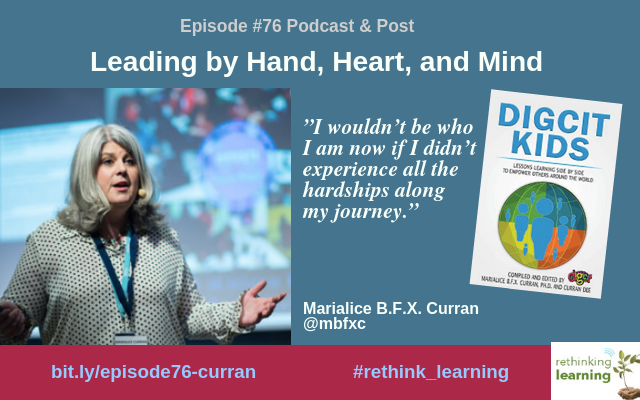
Podcast: Play in new window | Download
Subscribe: Spotify | TuneIn | RSS
Marialice’s mission is to turn negatives into positives and help to transform participants into designers, creative thinkers, global collaborators, problem solvers, and justice-oriented digital citizens. Enjoy her story and podcast!
Your background and passions
I’m really proud I’m from Boston. My story starts outside of Boston in a town called Winchester. That community has been instilled in me and impacted the choices I’ve made. I moved to Connecticut when I got married and have lived there for the past 14 years. I miss seeing people as I saw in Boston. There are rolling hills, and homes with garages. They click a button and go in their garage and then we never see people as I used to see in Boston.
My dad was a professor at Boston College, and I grew up going to the Campus School with my dad. This is where I truly believe the leading by hand, heart, and mind was modeled for me as a young child. Think you’ll like this influence in my life: http://cs.bc.edu/~gips/EENewsS03.pdf and https://www.bc.edu/bc-web/schools/carroll-school/sites/eagle-eyes.html/
Your Family
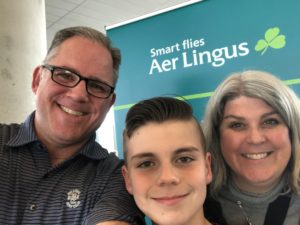
My husband, Sean Dee, is also an untraditional learner. He is Deaf and always said that it is not a disability but a serious inconvenience. Our son, Curran Dee, has parents who are role models that are very unique with different gifts and talents. Sean grew up lip reading and on our first blind date, he held onto my every word. I thought this guy really digs me, but I didn’t realize that he has to look at everyone that way. He didn’t learn Sign Language until he was in college and has often commented that sometimes he feels like he doesn’t belong in either the hearing world or the Deaf world.
Curran is the true introvert in our family. He is a fabulous traditional learner who does really well in school. I wish he broke the rules a little bit more, but he does not struggle academically. My husband and I are happy about it but also a little sad because all of our struggles have defined us. I know he’ll have his own struggles different than what we had.
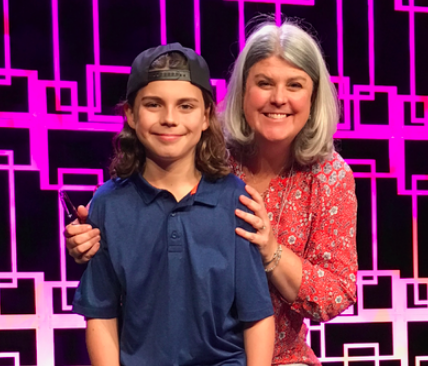
What it was like for you as a student
I went to Winchester Public Schools K-12 and I was a failure as a student. I had parents who believed in me and told me how smart I was and that I could do anything. When you are young, you believe anything your parents said. Yet, I bought into the teachers and high school counselor who told me I was not college material. In first grade, I was diagnosed and that is the worst word in the world. For me, it is like a four letter word. They used the “R” word when I was in the first grade.
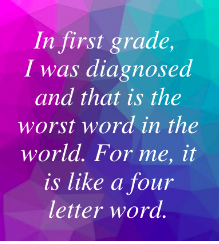
My parents did some outside testing and finally found out that I was dyslexic. I feel like there was a lot of education that my parents did for the school system because nobody in the system knew about dyslexia in the early 70s. I never fit in in elementary school. Every Friday there was a test in math and we need to transcribe the problems on the board. Every Monday you would check the board to see if your test was on the bulletin board. I never transcribed the question right. Those examples of not fitting in and always failing and feeling like a failure definitely defined me for the majority of my life. I didn’t want anyone to know because it was embarrassing and you feel like you are that diagnosis.
I remember in junior high, hiding in the bathroom so people didn’t have to see me go down that corridor for “those” kids. I was always putting on comedy routines in class so I was always late to class. And every single day in 7th grade, I had to go to detention. I look back now and ask “where were all the adults in that school in my life? Couldn’t they see the patterns and that I wasn’t doing this on purpose?”
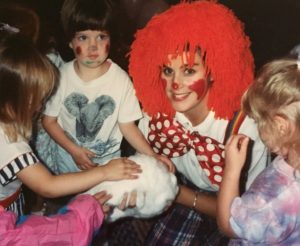 As I struggled as an untraditional learner, this saved me! I had one thing that I was good at! It was my mom who saved me in the most awkward stage of my life. We had all kinds of puppets from all over the world, I became a puppeteer at 11. My mom gave me business cards when I was 13 and we put an ad in the newspaper so I could put on puppet shows. In 1979, I started my own business in a time in my life that was horrible in school. I performed puppet shows for children’s parties on weekends. It made me unique, brought out my gifts and talents and was it was like a life raft. I continued to do puppet shows all through college and still have my puppets today.
As I struggled as an untraditional learner, this saved me! I had one thing that I was good at! It was my mom who saved me in the most awkward stage of my life. We had all kinds of puppets from all over the world, I became a puppeteer at 11. My mom gave me business cards when I was 13 and we put an ad in the newspaper so I could put on puppet shows. In 1979, I started my own business in a time in my life that was horrible in school. I performed puppet shows for children’s parties on weekends. It made me unique, brought out my gifts and talents and was it was like a life raft. I continued to do puppet shows all through college and still have my puppets today.
It was the reason why I’ve always wanted to bring out the gifts and talents of each and every student. Not until I became a connected educator and I was teaching teachers that we need to be role models and take risks and that’s when I shared my journey and started belonging as the Dyslexic Professor. Since then, I can’t tell you how proud I am that I am an untraditional learner.
HackAccess Conference video
Your journey as an educator
I looked at the most awkward time of my life and that’s where I became a teacher. When I took my first job in 1983, I didn’t tell anybody that I was dyslexic. But I wanted to make sure no other student felt the way I felt. When you think about our kids, each child is unique and comes to our classrooms with gifts and talents. It’s up to us to bring out those out in every single student. That brings me back to my passion for personalized learning.
Digcitsummites MARIALICE CURRAN from Planner Media on Vimeo
I could be resentful about what happened to me in the lost opportunities. But I’ve always looked at that glass not as half empty but completely full. Some people would make the assumption I’m an extrovert since I was the class clown, but I’m actually not. I really am an ambivert. I can rise to the occasion but it zaps my energy. I learned how to put on this persona as a mechanism to protect myself. You’ll never see me read from a script, ever. I learned things early on for survival. I’m very comfortable with not knowing. When you don’t know what someone is going to say, you are completely present with that person.
ISTE Member Profile:
https://www.mbfxc.com/uploads/4/1/8/4/4184069/mbfxc_iste_member_profile_2018.pdf
I went to the University of Arizona in Tucson because I wanted to do something different. I joined a program called S.A.L.T. (Strategic Alternative Learning Techniques program) and that is where I honed in my skills and how to bring out the best in all of my gifts and qualities. I never mentioned that I was dyslexic. When I first started graduate school, I was put in probation because of my transcripts. From graduate school on, I never looked back. I took that first teaching job in 1993 and still didn’t say anything about dyslexia. There were times at parent-teacher conferences where I could see myself struggling. When the parents wanted to hope for their child, I would reveal to them and their child my story. I never revealed that when I became a principal. I believe I did my doctorate at Boston College because someone said I couldn’t. I love to learn even though it wasn’t easy for me. When I graduated, I wanted to wear my dad’s doctoral robes so I did. When I took the job in higher ed, I didn’t tell them I was dyslexic.
Doctor of Philosophy and Associate Professor
I had a graduate student, Tracy Mercier, who invited me to her classroom. I remember the first time I ever got googled was from her 3rd graders who were checking if I was making responsible decisions. I had never googled myself and had no idea what was going to show up. I thought that I needed to take some risks and walk the walk. That’s when I decided to come out and never be ashamed of being dyslexic again. People’s words really do matter. If I had ever listened to my guidance counselor, I would have believed it. I shared my transcripts all through college and graduate school with her to demonstrate that I could learn. My journey to learn beyond dyslexia began with the support of my parents. All each child needs is at least one person to believe in them.
[Make sure you listen to Marialice’s story about her name Marialice B.F.X. Curran starting at 21:35]
DigCitKids: Lessons learning side-by-side, to empower others around the world
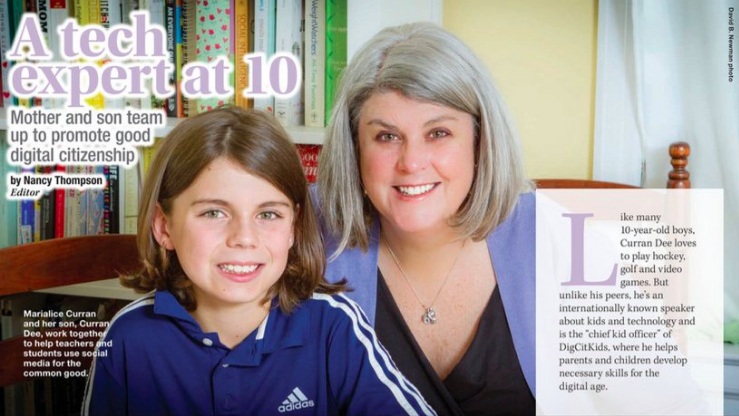
I never consciously involved Curran in my work or thought he would want to be involved in my work. It happened very naturally. When I was on the tenure track, he would come to class with me. He loved being on the college campus. All the students really took to him. The first time I put on a DigCit Summit on campus, I got up to do the closing remarks and he followed me up on stage. I was so surprised and asked him if he had something he wanted to say. He nodded “Yes!” He wanted to tell his blogging story so he did. When he was done, he leaned into the microphone and said: “Thank you very much!” We were publically known as a mother and son team.
[Listen to the rest of Marialice’s story about starting the Digital Citizenship Institute (DCI) from 30:00 on the message from InkGetsBetter and enjoy the videos below.]
Educator Insights | Taking Digital Citizenship Beyond Monitoring to Mentoring
Tech4Good Panel
I’m always hoping that I can inspire other untraditional learners! I haven’t blogged on this site for a long time, but it chronicles my early years as a connected educator in higher ed: https://mbfxc.wordpress.com/
Below is a more recent video from DigCitSummitEDU at Lake Shore Recap Short
*****
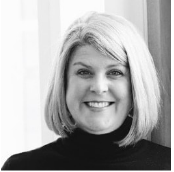 Dr. Marialice B.F.X. Curran is the Founder and Executive Director of the Digital Citizenship Institute. Her advanced graduate and doctoral studies on adolescent development at Boston College reinforced her commitment to service learning as Dr. Curran leads by hand, heart, and mind. As a mother and a connected educator, she has served as an associate professor, middle school teacher, principal and library media specialist.
Dr. Marialice B.F.X. Curran is the Founder and Executive Director of the Digital Citizenship Institute. Her advanced graduate and doctoral studies on adolescent development at Boston College reinforced her commitment to service learning as Dr. Curran leads by hand, heart, and mind. As a mother and a connected educator, she has served as an associate professor, middle school teacher, principal and library media specialist.
As a pioneer in digital citizenship, she developed and created the first 3-credit digital citizenship course for teachers in the United States. She co-founded the digital citizenship chat on Twitter (2011) and the Digital Citizenship Summit (2015). She serves on the international advisory board for GlobalMindED and is a researcher, keynote, international speaker and TEDxYouth speaker.
An entrepreneur and puppeteer at the age of 11, Dr. Curran’s experiences include world travel with a particular interest in the creative arts, middle-level education, special education, teacher education, and educational technology. Dr. Curran is committed to promoting social good using social media and technology. She believes in a community-driven approach to educating and empowering digital citizens to create solutions in local, global and digital communities. Her mission is to turn negatives into positives and help to transform participants into designers, creative thinkers, global collaborators, problem solvers, and justice-oriented digital citizens.
She has partnered with her twelve-year-old son, Curran, and the two are recognized professionally as a mother/son digital citizenship team. The dynamic duo model best practices while working with parents, educators, students and community organizations. They recently told their mother/son story, DigCitKids: Lessons Learning Side-by-Side, to Empower Others Around the World.
Website: https://www.mbfxc.com/ and http://www.digcitinstitute.com/
Blog: http://www.digcitinstitute.com/blog Contributor to http://www.jrney.org
Twitter: @mbfxc
******
For all of the Rethinking Learning podcasts with Barbara Bray, click on the podcast tab at the top, the logo below, or go to https://barbarabray.net/podcasts/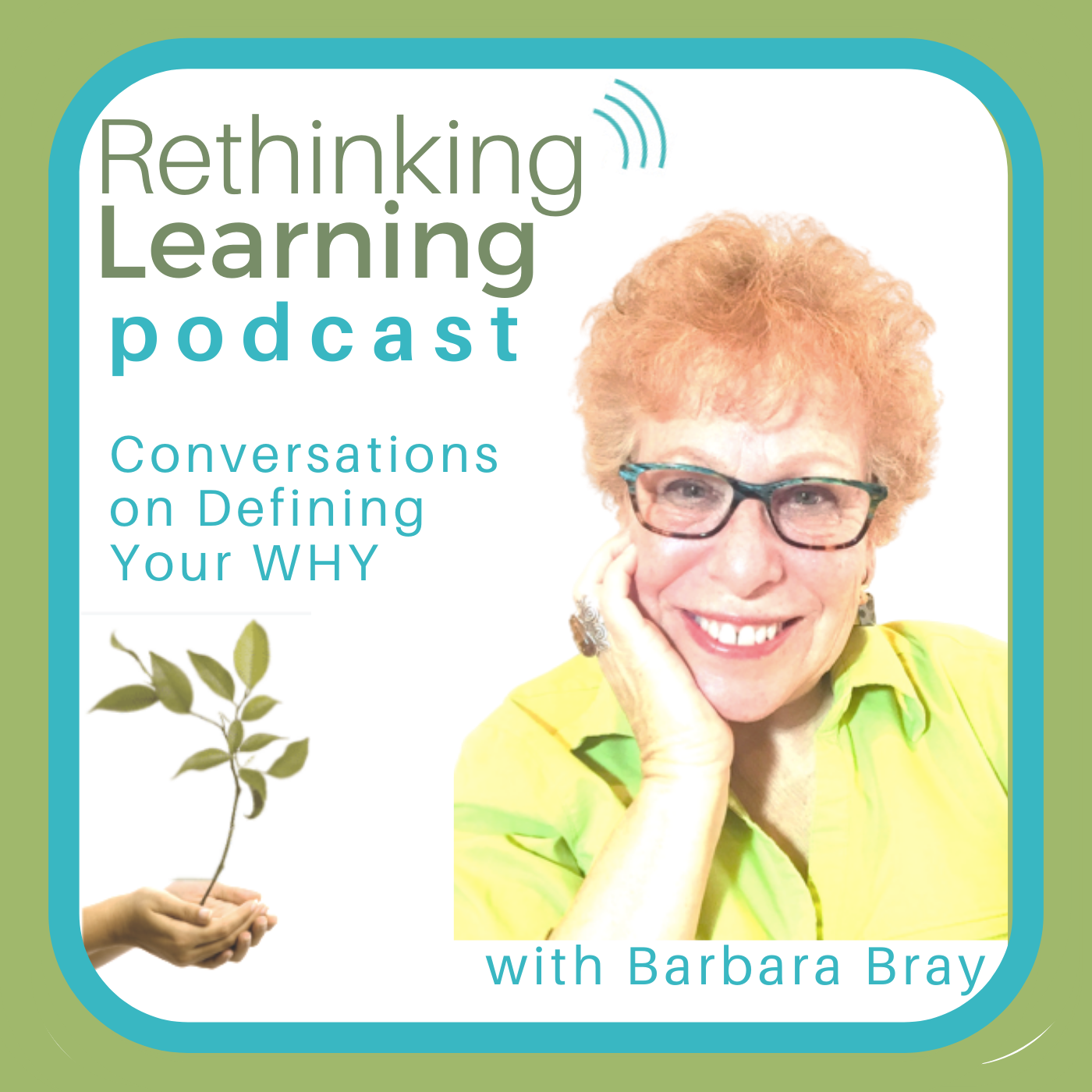
Go to this page for more information about Barbara’s new book, Define Your WHY.



